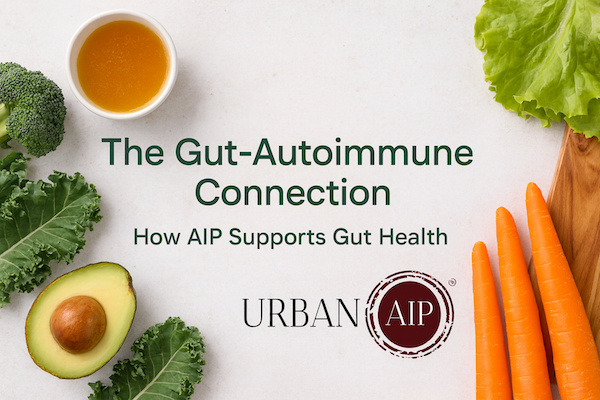
How AIP Supports Gut Health from the Inside Out
As a functional practitioner, one of the most important messages I share with clients facing autoimmune conditions is this: healing doesn’t start with chasing symptoms, it begins in the gut.
This isn't just clinical intuition, it's backed by science. According to research, up to 80% of the immune system resides in the gut-associated lymphoid tissue (GALT). This means that every bite you take and every signal your digestive system sends is influencing your immune system on a profound level, for better or for worse. When it comes to the development and management of autoimmune conditions, the health of your digestive system plays a critical role.
The Autoimmune Protocol (AIP) is one of the most comprehensive frameworks we have for calming immune activation, restoring gut function, and supporting long-term symptom relief. It addresses both dietary and lifestyle factors known to impact gut permeability, microbial balance, and immune modulation.
Why Gut Health Is Central to Autoimmune Disease
Your digestive tract is home to trillions of microbes, bacteria, viruses, and fungi that form the gut microbiome. This complex ecosystem influences everything from digestion and nutrient absorption to hormone regulation and immune response.
Furthermore, certain gut bacteria also produce essential vitamins, including folate (B9) and vitamin K, as well as neurotransmitters such as serotonin and GABA, which are crucial for mood regulation and brain health. This makes the gut not only central to physical immunity, but also to mental and emotional resilience.
It’s essential to clarify that autoimmune diseases are not diseases of a single organ; they are diseases of immune dysregulation. And because the gut is a primary site of immune surveillance and tolerance, gut dysfunction is now recognized as a major driver of autoimmunity.
Intestinal hyperpermeability (often referred to as "leaky gut") is one of the three foundational conditions required for autoimmunity to occur, the others being genetic predisposition and environmental triggers.
When the gut lining is compromised and/or inflamed, substances such as lipopolysaccharides (LPS), undigested proteins, and microbial fragments can pass into the bloodstream, triggering systemic inflammation. These immune responses may begin in the gut, but they don’t stay there; they travel to joints, skin, thyroid, brain, and other tissues.
Root Causes of Gut Dysfunction in Autoimmune Conditions
Gut dysfunction doesn’t happen overnight. It’s often the result of multiple, compounding stressors such as:
- A diet high in processed foods, sugar, and inflammatory fats
- Frequent use of NSAIDs, antibiotics, or acid blockers
- Chronic stress and poor sleep quality
- Environmental toxins and gut infections
- Nutrient deficiencies due to malabsorption
These triggers can lead to:
- Leaky Gut (Intestinal Permeability): The tight junctions in the intestinal lining become compromised, allowing foreign substances to enter the bloodstream. Studies show that patients with autoimmune disease often have elevated markers of intestinal permeability, such as zonulin.
- Dysbiosis: An imbalanced gut microbiome with low microbial diversity and overgrowth of opportunistic organisms has been linked to increased inflammation and altered immune function. Research shows people with autoimmune conditions like Hashimoto’s, rheumatoid arthritis, and multiple sclerosis often have measurable microbiome imbalances.
- Mucosal Immune Activation: Chronic exposure to inflammatory foods and toxins can trigger secretory IgA depletion, making the gut more vulnerable to further damage and infections.
How the AIP Framework Supports Gut Repair
The Autoimmune Protocol is a comprehensive dietary and lifestyle strategy designed to reduce immune load, promote gut healing, and restore immune tolerance. It does this in four powerful ways:
1. Removing Immune Triggers
The AIP diet eliminates foods most commonly associated with gut inflammation, including:
- Gluten, grains, dairy, legumes
- Nightshades (due to alkaloids that can increase gut permeability)
- Seed oils, refined sugar, and food additives
These exclusions help reduce intestinal inflammation, which is crucial for repairing the epithelial lining and alleviating systemic flares.
2. Restoring Nutrient Density
AIP emphasizes nutrient-dense, bioavailable foods that provide the building blocks for healing:
- Bone broth (rich in glycine and glutamine for gut lining repair)
- Organ meats and seafood (sources of fat-soluble vitamins, heme iron, zinc, selenium)
-
Colorful vegetables (polyphenols, prebiotics, and minerals for microbiome support)
Micronutrient repletion is a prerequisite for maintaining mucosal immunity and regulating the immune system in the long term.
3. Rebalancing the Microbiome
AIP naturally supports microbiome diversity through the inclusion of:
- Prebiotic-rich vegetables (e.g., Jerusalem artichoke, garlic, leeks, asparagus)
- Fermented foods (for those who tolerate them)
- Elimination of sugar and processed food, which reduces pathogenic overgrowth
- Research has shown that increasing microbial diversity can lower markers of inflammation and improve autoimmune symptom scores.
4. Reducing Systemic Inflammation
By removing immune triggers and supplying anti-inflammatory nutrients, AIP helps lower circulating inflammatory cytokines, such as TNF-α, IL-6, and CRP, thereby creating a more stable environment for healing.
Beyond the Gut - Why Understanding Digestion Matters: The North-to-South Principle
When it comes to restoring gut health, it’s not enough to simply target the intestines with probiotics or gut-healing supplements. Proper digestive function begins in the brain and works its way down. In functional nutrition, we refer to this as the “North-to-South” process of digestion.
Each step in the digestive cascade builds on the one before it. If one link in the chain is weak, it can compromise everything downstream, regardless of the number of supplements you're taking.
Let’s break it down:
- North (The Brain and Mouth): Digestion starts before you take your first bite. The cephalic phase is triggered by the sight, smell, and anticipation of food, which stimulates the production of saliva, gastric juices, and digestive enzymes. Eating on the go, in a stressed state, or distracted can short-circuit this phase entirely.
- Stomach: Adequate stomach acid (HCl) is crucial for breaking down proteins and activating enzymes such as pepsin. Without it, food sits too long in the stomach, contributing to bloating, gas, and poor nutrient absorption — and increasing the risk of bacterial overgrowth.
- Liver and Gallbladder: These organs play a crucial role in the digestion of fats. If bile isn’t flowing well — whether due to sluggish liver function or poor gallbladder signaling — fats remain undigested, creating inflammation and dysbiosis in the small intestine.
- The pancreas is a gland that produces digestive enzymes to break down carbohydrates, fats, and proteins. Low enzyme output means food reaches the lower gut undigested, where it can ferment, feed harmful microbes, and trigger immune reactions.
- Small and Large Intestines: These are where final digestion, nutrient absorption, and microbial activity occur. However, if everything above hasn’t been functioning properly, the intestines are often left overwhelmed, making it difficult to maintain balance, heal tissue, or support a diverse microbiome.
Gut healing isn’t just about the gut; it’s about optimizing the entire digestive system from top to bottom. If someone is struggling with dysbiosis, inflammation, or autoimmunity, focusing solely on the intestines without addressing stomach acid, bile flow, or enzyme production is like patching a leak without turning off the faucet.
This is why a comprehensive, stepwise approach like AIP is so effective in restoring gut function and calming immune dysregulation, and it’s about more than just food.
Lifestyle as Medicine: The Other Half of AIP
Healing isn’t just about what’s on your plate — it’s also about how you live. Research indicates that lifestyle factors play a crucial role in both gut and immune health. Chronic stress increases cortisol and damages the gut barrier. Inadequate sleep alters circadian rhythms that regulate immune responses. Sedentary behavior slows lymphatic flow and impairs the body's detoxification process.
This is why the AIP framework includes:
- Daily stress management (breathwork, nature time, journaling)
- 7–9 hours of restorative sleep each night
- Gentle, consistent movement like walking or yoga
- Time in nature (Forest bathing is a powerful immune modulator)
- Connection and joy activate the parasympathetic nervous system
- This holistic approach is what sets AIP apart and what makes it such a powerful tool in autoimmune healing.
Urban AIP Makes Gut Healing Simpler
Now that we’ve explored how the AIP framework addresses both diet and lifestyle, you might be wondering where to begin and feeling a bit overwhelmed. That’s precisely why I started Urban AIP. One of the first things I tell my clients is this: healing is hard enough. You shouldn’t also have to figure out every meal from scratch while trying to adopt new routines, manage symptoms, and rewire stress patterns.
By taking the burden of AIP cooking off your plate, ready-made meals, whether through a trusted AIP-compliant delivery service or thoughtful home meal prep, free up precious time and energy. This space allows you to focus on the deeper work: improving sleep, managing stress, getting outside, and rebuilding your rhythm.
Once you’ve established a strong routine and feel more confident in your lifestyle changes, you can begin integrating your own AIP recipes and cooking practices into daily life. Ready-made meals remain just as essential during the reintroduction phase, giving you a solid foundation of safe, healing foods while you isolate and test one new ingredient at a time.
Think of these meals as tools to support your healing, not shortcuts, but scaffolding for long-term success. The real goal is sustainable change, and that takes support because healing your gut shouldn’t feel like another full-time job.
If you're ready to nourish your gut and feel like yourself again, we're here to help one healing meal at a time.


